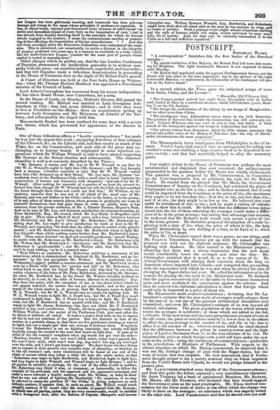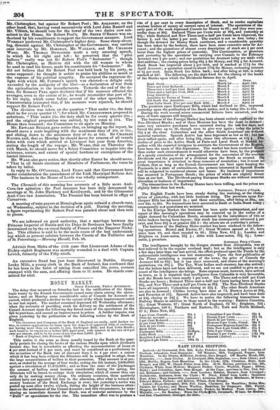Last night's debate in the House of Commons was perhaps
the most unsubstantial and disjointed that ever occurred; the subject-matter propounded in the question before the House was wholly undiscussed.
The question was, a proposal by Mr. CHRISTOPHER, in Committee on the Corn-importation Act, to substitute his scale for Sir Robert Peel's. He started from the ground that Mr. Meek, the Government Commissioner of Inquiry on the Continent, had estimated the prices of Continental corn at too low a rate; and he further assumed, that if corn could be imported from the Continent at the price of 26s., the maximum duty ought to be not less than 30s. ; if at 30s. to 34s., not less than 25s. ; and if at 40s., the duty might be as low as 20s. He believed that corn could be introduced at 30s. to 348.; and he made a variety of calcula- tions to show that it could. He believed that the different towns intro- duced into the list of those returning the averages would make a differ- ence of 28. in the gross average ; but, taking that advantage into account, he reckoned that Sir Robert's scale would only secure a price of 54.s. to the home grower. He therefore proposed the adoption of a scale be- ginning with a duty of 25s. when the price of wheat is 50s., the duty steadily diminishing by one shilling at a time, to be fixed at Is. when the price is 73s. or more.
When Mr. Christopher ceased there was a pause ; no one rising, until Mr. FRANCIS THORNHILL BARING got up, with the remark that the proposal met with not the slightest response : Mr. Christopher was fighting with shadows. He then turned to the Ministerial project ; observing that there was a strong impression that the new mode would considerably lower the averages and raise the duty : Mr. Christopher admitted that it would do so to the extent of 28. He twitted Government with altering their intention about the duty on. American wheat imported into Canada ; and compared that proceeding with the reproaches with which he was met when he altered his plan of changing the Sugar-duties last year. He called for information as to the reasons for placing the two rests in the Ministerial scale. He declared that the papers successively laid on the table by Government themselves more and more confirmed the conclusions against the scheme. And then he entered into elaborate calculations to show that foreign wheat could only be imported at a price of about 458.
Mr. GLADSTONE made counter-calculations ; declaring that Mr. La- bouchere's estimate that the new mode of averages would enhance them by the sum of 5s. was one of the grossest arithmetical absurdities ever committed ; and even Mr. Christopher's estimate of 2.e. was beyond all rational calculation. The gross population of the towns which already return the averages is 4,000,000 ; of those which are added to the list, 1,600,000. If the new towns sell the same proportionate amount of corn as the old towns, the price of corn there must be 7s. lower than in the others to affect the gross average to the amount of 28., and 10s. or 12s. less to affect it to the amount of 5s. ; whereas returns which he cited showed that the difference between the prices in country-towns and the high prices of London fluctuates from Is. to the rare extreme of 6s. 11d. He calculated the price at which foreign corn could sell here under the new scale at 608. to 638. ; citing the testimony of commercial men—preferable to the calculations of Members of Parliament. With respect to the altered intention on which Mr. Baring commented, he observed that it was not Mr. Baring's change of plan with the Sugar-duties, but the want of notice, that was culpable. He now announced, that if Parlia- ment thought proper to lay a purely nominal duty on wheat imported from the United States into Canada, he would not pledge himself to the present plan.
Mr. LABOUCHERE attacked some details of the Government scheme ; and from this point the debate assumed a very miscellaneous character. Sir Joule TYVIELL led a band of agricultural Members, Mr. Bargees, Mr. Mims, and Mr. FLEMING, who declared that they should support the Government plan as the most practicable. Mr. Mu.Ls derived con- solation for the lower scale of duties in the effect which the change was likely to have on the averages ; an admission which was eagerly seized on the otter side. Lord PALMERSTON said that he should vote not with
Mr. Christopher, but against Sir Robert Peel ; Mr. AOLIONBY, on the other hand, that, having voted successively with Lord John Russell and Mr. Villiers, he should vote for the lower of the two duties now sub- mitted to the House, Sir Robert Peel's. Mr. Siam O'BRIEN was au- thorized by his constituents to support the Government measure. Lord WORSLEY preferred Mr. Christopher's higher duty. Some sharp-shoot- ing, directed against Mr. Christopher or the Government, was carried onat intervals by Mr. HoasmeN, Mr. WALLACE, and Mr. CHARLES Wool.% Mr. Thomas DUNCOMBE made a very amusing speech, in which he hit right and left : he perceived that the " pilot balloon " really was not Sir Robert Peel's " foolometer " ; though Mr. Christopher, as Moliere did with the old woman to whom he used to read his farces, made his constituents his " foolometer." He did not believe that Sir Robert Peel was held back by his party, as some supposed : he thought it unfair to praise his abilities so mach at the expense of his political integrity. He accepted the rapturous de- light with which Mr. Ferrand's speech was cheered—a delight only exceeded by the malignity of the libel—as a declaration of war from the agriculturists to the manufacturers. Towards the end of the de- bate, Sir ROBERT PEEL again declared that if his measure affected the averages, even to the extent of 2s., he would reconsider that part of it. In his reply, which came before several of the other speeches, Mr. CstitnrrornEa intimated that, if his measure were rejected, he should support Sir Robert Peel's.
The division was taken on the question " That under 51s. the duty shall be for every quarter 1/."; for which Mr. CHRIWTOPHER proposed to substitute, " That under 51s. the duty shall be for every quarter 25s. ; and the original proposition was carried, by 306 votes to 104. The House then resumed ; the Committee to sit again on Monday.
Mr. EDWARD BULLER gave notice that, on bringing up the report, he should move a scale begining with the maximum duty of 20s. at 518., and sliding down to the minimum duty of 6s. at 64s. Sir CHARLES NAPIER said, that on Monday he should move for returns of all vessels laden with corn which arrived at Liverpool last year from America; stating the length of the voyage ; Mr. WARD, that on Thfirsday the 10th March, he should move for a Select Committee to inquire into the existence, nature, and extent of special burdens or exemptions of the landed interest.
Mr. WARD also gave notice, that shortly after Easter be should move, " That in all future elections of Members of Parliament, the votes be taken by ballot. In reply to Mr. O'CoNNELE, Lord ELIOT said that Government have under consideration the amendment of the Irish Municipal Reform Act. The business in the House of Lords was wholly unimportant.



























 Previous page
Previous page